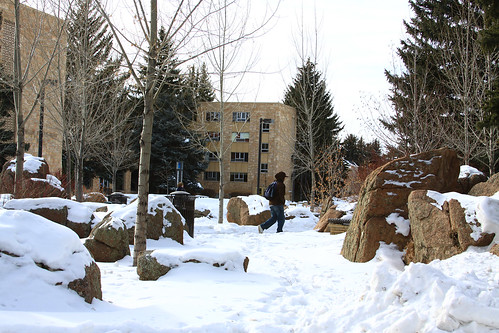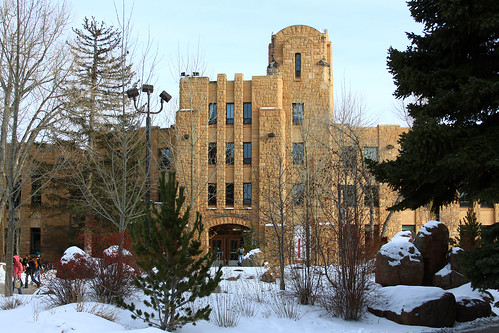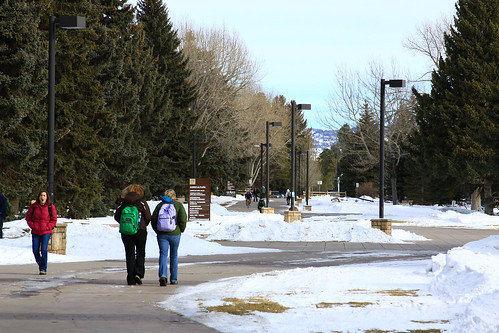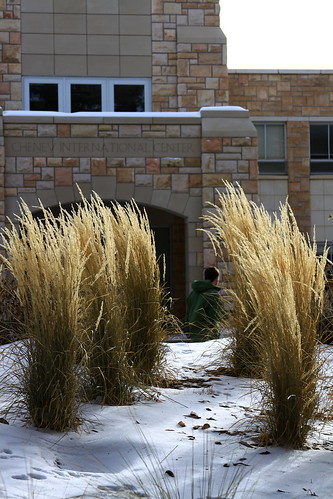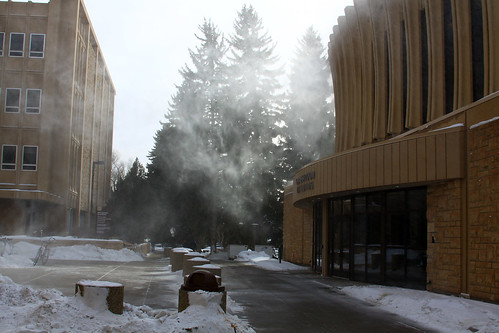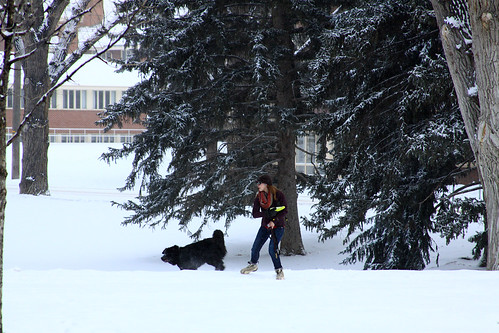I have thus laid my disappointments in The Laramie Project bare to the world and my personal Festivus has now ended; now, we need to take one step further than the regular Festivus airing. It's time for me to reflect upon these grievances to determine which disappointments are legitimate and which are just my plaintive whining about how Tectonic did not write the play I would have wanted them to write.
I wanted to get my grievances out in the open with this series, sure, but I also wanted them to turn into something more productive (and less pathetic) than using the Internet to whine like a tragically middle class emo kid with a YouTube channel. If I am to accomplish that, then I need to step back and look at these criticisms with a little more distance and a lot more insight. I need to be radically reflexive, which means that I have to rigorously examine my own motives and interior monologue just as rigorously as anybody else's-- and I have to be consciously aware of that process. If the Scripture calls us to work out our salvation with fear and trembling, then our scholarship should call us to work out our conclusions with fear and loathing. That means it's once more time to dig deep and think hard about fear, loathing, and The Laramie Project.
Why? If there is anything I've learned so far from this experience, it's this: Understand where your own perspective and prejudices come from, and act in awareness of that knowledge. Every time. The most inadequate (and inaccurate) scholarship sometimes comes from a failure to understand one's own personal tilt or experiences informing their scholarship in ways they don't intend. Some of the best scholarship comes from those who do. And, since I'm in the precarious position of being personally and emotionally tied to this event and the play it produced, I need to be extra aware of how that changes my perspective. Know thyself, Jackrabbit, and thou shalt improve thy scholarship. I think the world would be a better place if everybody followed that advice, and since I kind of turned Tectonic over my knee for it, I had better do it with myself, too.
So, which of these ways in which I feel like Tectonic has disappointed me are perhaps legit, and which are merely a difference of opinion or personal taste? That's a very important question to ask, so let's see how my summation of the Grievances holds up after the jump!
Calling all Theater companies and performers!
Open Call to Theater companies, performers, researchers:
I would like to hear other voices besides my own on this blog. If you'd like to write about your TLP experiences here, e-mail them to me and I'll put them up.
Topics can include dramaturgy to staging to personal responses to the play. Anything goes!
I would like to hear other voices besides my own on this blog. If you'd like to write about your TLP experiences here, e-mail them to me and I'll put them up.
Topics can include dramaturgy to staging to personal responses to the play. Anything goes!
Sunday, April 10, 2011
Tuesday, April 5, 2011
Scholarship: First-hand Accounts of the Shepard Tragedy
Now that I've had free time to start back up on bibliographic snooping, I'm starting to find a lot of personal responses to Shepard's death from Laramie witnesses, but what surprised me is to see where these personal experiences are popping up: in trade journals. It seems that a lot of people in Laramie and Fort Collins who were involved somehow with the Shepard attack looked introspectively at how they personally and their professions were forced to respond. Douglas Black, for instance, bore the nation's brutal outrage and abuse for months afterward as a university spokesperson in CSU; Dr. Klein felt his professional role seep deeply into his personal life and his family's connections to the killing.
The exception, of course, is Walt Boulden's recollection of Matt Shepard as a personal friend, which is purely a personal recollection of Matt and was published in Journal of Gay and Lesbian Social Services a year after TLP opened in Denver. He recalls a strawberry hunting expedition on Casper Mountain with Matt that really humanizes Shepard-- and Walt Boulden, come to think of it. It's worth a read if you can get hold of it.
In any case, enjoy!
Black, Douglas. "Straw Men: An Exercise in Virtual Unreality." American Scholar 69.2 (2000): 93-100.
Boulden, Walt. "A Tribute to Matthew Shepard." Journal of Gay & Lesbian Social Services 13.1(2001): 7-14.
Hurst, James C. "The Matthew Shepard Tragedy: Management of a Crisis." About Campus 4.3 (1999): 5-11.
The exception, of course, is Walt Boulden's recollection of Matt Shepard as a personal friend, which is purely a personal recollection of Matt and was published in Journal of Gay and Lesbian Social Services a year after TLP opened in Denver. He recalls a strawberry hunting expedition on Casper Mountain with Matt that really humanizes Shepard-- and Walt Boulden, come to think of it. It's worth a read if you can get hold of it.
In any case, enjoy!
Black, Douglas. "Straw Men: An Exercise in Virtual Unreality." American Scholar 69.2 (2000): 93-100.
As some of you may know, Colorado State University's homecoming parade coincided with Matt Shepard's brief stay before his death at the Poudre Valley Hospital in Fort Collins. At some point in the parade, which had a "Wizard of Oz" theme, one float erected a straw man in the truck with the phrase "I'm Gay" spray-painted on its face and "up my ass" on its back. That was the second attack on Shepard, only this time in the form of a cruel joke, playing out not far from where Matt was struggling to survive. That stunt cost one Greek organization its charter, and another nearly suffered the same fate.
Douglas Black worked at CSU in the President's office as a staff member, and he bore the impossible burden of the nation's outrage; almost immediately, Black, as the mouthpiece for the university on this incident, became the focus of national abuse. Outrage against the float mutated into personal insults and threats to him personally, and the incident left Black feeling personally scarred in much the same way as his childhood bullying had; he also notes, "The most savage attackers were those claiming to speak for tolerance." His perspective on the way the story traveled, how the university responded, first-hand look at how Cyberspace and messaging technology fueled the outrage and fueled vigilantism and abuse is extremely personal and interesting. We may be used to this in our Facebook world and Twitterverse, but it was still all new in 1998. Also, the writing is really, really good. You can tell what Douglas Black does for a living.
Boulden, Walt. "A Tribute to Matthew Shepard." Journal of Gay & Lesbian Social Services 13.1(2001): 7-14.
If you want a perspective of Matt Shepard that doesn't involve the typical platitudes but is nevertheless entirely positive, Walt Boulden's tribute in Journal of Gay and Lesbian Services really is rather touching. Boulden seems to feel he is charged with the impossible task of rescuing Matt's memory from the grave, which is an unfair burden to take on, really; what he eventually produces, however, makes Matt feel more human to me than anything else I've had time to read so far.
Boulden knew Shepard in Casper and remained friends with him at UW. There's one particular story of Matt he shares which at first seems a quirky choice-- a tale of hunting for wild strawberries on Casper Mountain-- that offers the reader a tantalizing glimpse into Matt Shepard's personality.
If you can't find the article, this also serves as the introduction to the book From Hate Crime to Human Rights: A Tribute to Matthew Shepard. Routledge, 2001.
Hurst, James C. "The Matthew Shepard Tragedy: Management of a Crisis." About Campus 4.3 (1999): 5-11.
This is the most impersonal recollection of the ones I've read, but that's due especially to the kind of article Hurst is writing. James Hurst was the VP of student affairs at UW when Matthew Shepard was murdered. The article explains the university's actions in trying to deal with the sudden crisis on campus it caused, and he details especially what the university president, student organizations, and administration did in the days following the beating to deal proactively with the incident. This is a great article if you want a backstage peek at how the LGBTA, the university, and the community responded to the hate crime.Klein, Daniel S. "What Happened in Laramie." Annals of Internal Medicine 130.3 (1999): 235-236.
(Oh, and he also mentions that initial reports from the police mention the possibility that the murder was a robbery and/or a hate crime. Simultaneous narratives. Just sayin'. )
Daniel Klein is an MD in Laramie and was the county health officer when Matthew Shepard was beaten, and his response to the tragedy is both as a Laramie community member and as a concerned doctor. His narrative of how his family experienced the crisis shows just how close this community really is, relationally speaking. Even though he was not the attending physician in the ER that night, his position brought him in the orbit of the murderers, their acquaintances and family, the media, the victim, and the emergency workers who attended to him. As a personal/professional response to Matt's murder, he gives a good representation of one eyewitness perspective of the Shepard tragedy. Note especially how the narratives of two previous murders in Laramie, the landscape, and community play in his telling.
Labels:
Firsthand Accounts,
scholarship
Sunday, April 3, 2011
Aphorism of the Month, Courtesy of Nothing Profound
Spring is here, a new month has arrived, and in honor of thinking too hard and diving into introspection I am going to initiate a new tradition: My Favorite Aphorism for the month. These come from "Aphorism of the Day," run by a curious philosopher and lover of experience who calls himself Nothing Profound. One eye sees things through Nietzsche, the other sees the world through Whitman, all written in the style of Solomon and the insight of... himself. Marty's an interesting enough guy without all the philosophical trappings.
So, without further ado, here is the aphorism which will be my secular lectio for the month:
So, without further ado, here is the aphorism which will be my secular lectio for the month:
The power to judge becomes a substitute for the power to love.
Personally? I like it. Feel free to discuss among yourselves.
Thanks, Marty!
Labels:
The Aphorisms
Friday, April 1, 2011
Laramie In Picures: UW by Snowlight
The problem with visualizing the UW campus from most promo photos is that they don't show what it looks like for most of the school year-- that is, covered in snow. Up on the top of Laramie's sub-arctic plain, the snow comes early and lingers well past its time. As such, most students walk through Prexy's Pasture on the way to their classes when the ground is white rather than green, attended by the crunch of snow under boots rather than the smell of fresh-cut grass. The bewildering spring in Laramie usually comes rather late, and even during finals week, one can often find sunbathing undergraduates not too far from unmelted drifts in the sun-starved shadows.
But we Rocky Mountain types adapt to such conditions rather quickly; very little changes in our routines except the numbers of layers we wear on our way out the door. Most students who bike to class still do so in the winter, their knobby tires balanced perilously on the thick winter skin of ice glazed on the streets and walkways. Some of my favorite memories involve such tomfoolery as watching my husband-to-be play Frisbee with his buddy in the middle of the soccer field in the dead cold of January, and the year I married my Frisbee-toting trumpet player saw a freak snowstorm in the second week of June, which knocked down power lines and trees all over Laramie.
One of the things I really like about the UW campus now is the inclusion of some natural elements into the landscape, which soften the edges of the concrete in the summer, but in winter they add dimension to the endless folds of snow. As such, these boulders, trees and natural grasses make the most of Laramie's most populated season-- winter. I hope you enjoy the view!
The best view of the Student Union I could get, with a lot of that landscaping in the foreground.
North of Prexy's Pasture, looking back towards the Agriculture building and the College of Education (both obscured.)
Although I'd never want to try and ride a street bicycle on snow pack, it's not all that unusual in Laramie. Many students continue to bike through campus even in winter, even though it's impossible to keep the streets and walkways clear of ice and pack. My preferred transport was a mountain bike with very wide, knobby tires.
Some of that natural landscaping I was talking about. This is in front of the Cheney Center.
Oh, that cold, cold wind ripping off the top of the Classroom building that everyone knows so well! You get a sort of natural wind tunnel between the science buildings here sometimes.
This was one happy mutt, but his owner's fingers got a little cold after their game of fetch.
But we Rocky Mountain types adapt to such conditions rather quickly; very little changes in our routines except the numbers of layers we wear on our way out the door. Most students who bike to class still do so in the winter, their knobby tires balanced perilously on the thick winter skin of ice glazed on the streets and walkways. Some of my favorite memories involve such tomfoolery as watching my husband-to-be play Frisbee with his buddy in the middle of the soccer field in the dead cold of January, and the year I married my Frisbee-toting trumpet player saw a freak snowstorm in the second week of June, which knocked down power lines and trees all over Laramie.
One of the things I really like about the UW campus now is the inclusion of some natural elements into the landscape, which soften the edges of the concrete in the summer, but in winter they add dimension to the endless folds of snow. As such, these boulders, trees and natural grasses make the most of Laramie's most populated season-- winter. I hope you enjoy the view!
The best view of the Student Union I could get, with a lot of that landscaping in the foreground.
North of Prexy's Pasture, looking back towards the Agriculture building and the College of Education (both obscured.)
Although I'd never want to try and ride a street bicycle on snow pack, it's not all that unusual in Laramie. Many students continue to bike through campus even in winter, even though it's impossible to keep the streets and walkways clear of ice and pack. My preferred transport was a mountain bike with very wide, knobby tires.
Some of that natural landscaping I was talking about. This is in front of the Cheney Center.
Oh, that cold, cold wind ripping off the top of the Classroom building that everyone knows so well! You get a sort of natural wind tunnel between the science buildings here sometimes.
This was one happy mutt, but his owner's fingers got a little cold after their game of fetch.
Labels:
In Pictures,
University of Wyoming
Monday, March 28, 2011
Links: Kaufman's take on "10 Years Later" in "American Theater"
When studying The Laramie Project, usually the first starting point for studying the play are two articles written by Don Shewey and Moisés Kaufman published in American Theatre. With the premiere of 10 Years Later came yet another article from Kaufman about the project, again published in AT. Like his previous work, this article is also an expository work explaining the process of producing the play, from its first inception, changes to the process, and its final form as a worldwide Internet linkup premiere. I'm not entirely sure how helpful Kaufman's explanation is for explaining the whole process behind the creation of 10 Years Later in reality, but it is surely a great exploration of what Kaufman thought they were doing as they interviewed Laramie residents and former residents again, ten years after Matthew's murder. It makes his investments, beliefs and goals for the new epilogue very clear for the researcher.
One thing I found interesting is that Kaufman claims that this new play "deals with history" and how it's created, which is quite different from the first play's goal. That's fair enough, but he talks (again) about the emergence of the robbery narrative as if it started after the fact, an attempt to re-write history-- and as I have pointed out repeatedly from my little soapbox in this little corner of the Interwebs, the robbery narrative arose at the exact same time as the hate crime narrative. Oh well. He also calls his re-interviews with DeBree and Dave O'Malley as an attempt to "clarify the facts." That may be the most interesting comment I've heard Kaufman make in print so far.
Nevertheless, how and why someone chooses one narrative over another as "truth" is particularly interesting regardless-- not just for Laramie, but for Mr. Kaufman, Tectonic Theater, and myself as well. You can read the article online here through the Theatre Communications Group website.
Source:
Kaufman, Moisés. "Anatomy of an Experiment: When the Tectonic Team Returned to The Laramie Project, the Docudrama's Sequel Became a Collective Creation Seen and Heard 'Round the World." American Theatre Jul/Aug 2010. Web.
One thing I found interesting is that Kaufman claims that this new play "deals with history" and how it's created, which is quite different from the first play's goal. That's fair enough, but he talks (again) about the emergence of the robbery narrative as if it started after the fact, an attempt to re-write history-- and as I have pointed out repeatedly from my little soapbox in this little corner of the Interwebs, the robbery narrative arose at the exact same time as the hate crime narrative. Oh well. He also calls his re-interviews with DeBree and Dave O'Malley as an attempt to "clarify the facts." That may be the most interesting comment I've heard Kaufman make in print so far.
Nevertheless, how and why someone chooses one narrative over another as "truth" is particularly interesting regardless-- not just for Laramie, but for Mr. Kaufman, Tectonic Theater, and myself as well. You can read the article online here through the Theatre Communications Group website.
Source:
Kaufman, Moisés. "Anatomy of an Experiment: When the Tectonic Team Returned to The Laramie Project, the Docudrama's Sequel Became a Collective Creation Seen and Heard 'Round the World." American Theatre Jul/Aug 2010. Web.
Labels:
10 Years Later,
Moisés Kaufman,
scholarship,
theater
Wednesday, March 23, 2011
The Bibliography Upgrade is Complete!
 The updated bibliography lists are now available! You know, for all dozen or so of you currently studying TLP. But I hope it helps nonetheless...
The updated bibliography lists are now available! You know, for all dozen or so of you currently studying TLP. But I hope it helps nonetheless... After I had gathered a lot of things I wanted to add to my old bibliographic master-list on this blog, I made things easier on myself by dividing things up to make searching through it a little easier on the researcher.
When you now click on the Bibliography link, which is now just under the title bar at the top of the page, you will be directed to a page asking you to choose which page you want: literary/dramatic, or non-literary/dramatic sources. Things which are useful in multiple applications, however, appear on both lists.
With this also came an increase in useful material on both lists. If you have any questions, remember you can always email me at jackrabbit.blog@gmail.com and I'll help out as much as possible. I'll even ferret things out for you from my capacious Research I library if you need it.
Also, if there's something that should be on this list that currently isn't, please, by all means let me know! I'll happy to add it to the list.
Labels:
links,
scholarship
Monday, March 21, 2011
The Airing of Grievances, Charge 4
Being the Final Grievance (hooray!) Against Tectonic Theater
During this Festivus Season
 I was having a conversation a while back with an acquaintance of mine who also studies The Laramie Project. Dr. F, as I'll call her, is this beautiful, crazy, wonderful, innovative rhetoric and composition professor in our department, and she's a theater fanatic on the side. Our chat eventually wandered over to Angels in America, a play which we both love, and she started talking about staging.
I was having a conversation a while back with an acquaintance of mine who also studies The Laramie Project. Dr. F, as I'll call her, is this beautiful, crazy, wonderful, innovative rhetoric and composition professor in our department, and she's a theater fanatic on the side. Our chat eventually wandered over to Angels in America, a play which we both love, and she started talking about staging."One thing I've noticed about American theater right now," she told me, "is that most directors don't seem to trust their audiences as much as those abroad." I had to ask for clarification on what she meant. "Well, take the Central Park encounter in Angels," she responded. "When I was studying in London, I saw a production where the two actors in that liaison were on opposite sides of the stage. They just trusted the audience to make the connection about what's going on without having to stage the action with each other or even act it out. It made that moment of sex look as disconnected and lonely as it really was." Having seen the Laramie production of Angels, I could really see her point, where that sexual encounter was enacted on a platform between the actor playing Louis and Jed Schultz.
"Most of the plays I saw in London played fast and loose with the directing, which opened up the stage to all sorts of new possibilities," she continued. "But that meant that they had to lean on the audience to make the connective leap. I really haven't seen a lot of theater here in the States that is willing to trust their audiences quite like that."
Trusting the audience. Although I'm a little on the fence about her judgment of American theater, I've been mulling those words over for quite a while now. What's more, I think I'm starting to see a connection to that idea with some of the aesthetic differences I have with The Laramie Project. As I've been working through my "Airing of Grievances," I've started to notice a few patterns; sure, I have problems with the structure of the play and how the concept relates to Laramie as both a community and place, but there's something else here, too, that has more to do with the structure of the play itself.
I think that maybe 1) these people are incredible, brilliant, and talented writers with a clear interest in dramatic form, and 2) these form-driven dramatists are afraid to trust their audiences too much with the factually ambiguous story of Matt's murder. Perhaps, Tectonic wants to tell a story of cause/effect through Laramie's voices, but the narratives we have don't lend themselves to it, and the only way to get their voices to tell that cause/effect story is to push them that way. This problem of overworking, strangely, has an element of narrative and truth to it, too: Tectonic's willing to let narrative drive most of their play, so long it never gives any doubt about the forensic facts of the murder, of the cause and its effect. A fear about the fragility of forensic truth might be forcing them to heavily edit the narrative truth.
And so, I hereby submit my final charge against Tectonic Theater regarding their production of The Laramie Project and 10 Years Later, which I guess isn't really a bad thing at all:
#4: Trying Too Damn Hard
Maybe this is just a difference of aesthetic taste on my part, and on that note, failure to meet the needs of my literary palate shouldn't really be a grievance per se. Nevertheless, it's a concern I want to discuss.
Okay, so I know I keep wandering back to South Africa's apartheid past and the TRC whether it fits or not, but hey, it's the only analogue to narrative and determining truth I can comfortably speak about. So, here goes...
Labels:
Angels in America,
narrative,
Tectonic Theater,
The Grievances,
theater,
truth
Subscribe to:
Posts (Atom)


